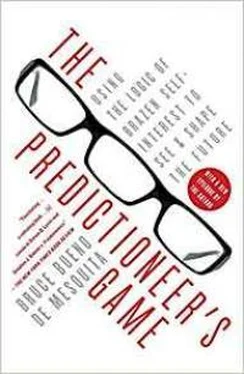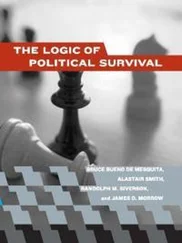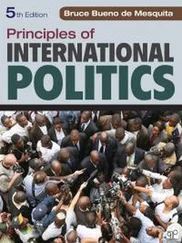When the vote was over, the committee member with whom I had talked earlier invited me to lunch. He had one question for me: Did you have anything to do with picking our CEO? I smiled and changed the subject. He was sure I did, and I knew he knew, but I was sworn to secrecy. The lunch was great.
SORRY, EINSTEIN: GOD DOES ROLL THE DICE
As we see in moving from the prisoner’s dilemma to the bank example to the voting strategies, even in relatively simple games involving relatively few players there can be multiple outcomes. This fact adds yet another strategic dimension to decision making, particularly as games, in the real world, are often played over and over between the same players.
Any time a game has more than one possible result, there is a special type of strategy (called a mixed strategy) that can influence what happens. In a mixed strategy, each player chooses actions probabilistically—say, by rolling dice—to influence what other players expect to get out of the game. Einstein’s God may not have played dice with the universe, but we mortals definitely roll the dice with each other.
Whenever you watch a football game and complain about a coach’s choice of plays, you probably were watching a mixed strategy at work. For instance, when the ball is on the one-yard line, the play that is most likely to get the ball across the goal line is for the fullback to jump over the pile of players in front of him. Yet coaches often have the quarterback pass the ball or hand off to a running back. The reason: if a coach always called for the fullback to go over the top, the defenders would concentrate the defense at that point, and the play would probably fail. By mixing the calls, the offense forces the defense to spread out, thereby improving the odds of success over repetitions of the situation. Interestingly, this sort of mixing of strategies carries important lessons for business, politics, and lots of other parts of life. Rolling the dice is one way to alter how other people perceive a situation.
Using strategies that involve mixing up moves to create a change in expectations is something that comes up all the time. Although applied game theorists often like to ignore these complicated “mixed strategy” approaches to problems, they do so at their own peril. Rolling the dice can really make a difference in how things turn out.
Examples of such gambling are all around us, and some great movies roll the dice very cleverly to create climactic moments. Who can forget in The Princess Bride the back-and-forth over which wineglass is poisoned, and the clever resolution (both were poisoned—it pays to build up an immunity to the poison you plan to use on yourself and others). Or how about the fabulous scene from The Maltese Falcon in which Sydney Greenstreet’s character, Kasper Gutman, desperately wants the jewel-encrusted bird? Only Sam Spade (Humphrey Bogart) knows where it is, and Sam Spade is no fool. Gutman threatens that Joel Cairo (Peter Lorre) will torture Spade to find out where the bird is, but Spade counters, “If you kill me, how are you going to get the bird? If I know you can’t afford to kill me till you have it, how are you going to scare me into giving it to you?” Here Spade, like any good game theorist, questions the credibility of Gutman’s commitment to make him talk. We know and Sam Spade knows that, without a real commitment to kill him, Gutman can’t get him to talk. But Gutman is no fool either. He knows just how to make the dice tumble, creating the prospect that Spade will talk to save himself. After some clever give-and-take, Gutman retorts, “As you know, sir, men are likely to forget in the heat of action where their best interests lie and let their emotions carry them away.”
There it is: “Men are likely to forget in the heat of action where their best interests lie and let their emotions carry them away.” How beautifully put. He’s just explained that Joel Cairo will try to be careful not to kill Spade, but then, Cairo can get emotional, so there is also a chance that if Spade doesn’t talk he’ll end up dead. In this brief exchange we see three lovely principles of game theory at work: the question of credible commitment; the use of playing probabilistically to alter how others look at the situation; and the pretense of irrationality (the heat of the moment) for strategic advantage. What could be truer to life’s fears and calculations? How many of us would dare to stay silent given Sam Spade’s gamble: keep the bird and maybe die, or give up the falcon and (maybe) live?
With a bit of luck, it will become apparent that game theory is not limited to parlor tricks, movie scripts, and brainteasers. It is a powerful tool for reshaping the world. In the remaining chapters, we will use these foundations to see just what kind of problems rational choice theory can tackle, and how math, science, and technology now allow us to predict and engineer particular outcomes that we might otherwise assume would only be determined by a random mix of good or bad fortune and a heavy dose of human whim.
4

BOMBS AWAY
WE NOW UNDERSTAND the basic principles of game theory. That’s all well and good, but how do we use these principles to solve the big problems of our time? Well, let’s not mess around—let’s take a look at North Korean disarmament.
Being born in North Korea pretty much ensures having a miserable life. The average North Korean has to work an entire year to earn what an average American, Irish, or Norwegian worker makes in around four days. Money isn’t everything, but it is a pretty good first-cut approximation of quality of life.
Of course, being born in North Korea is not always bad news for everyone. Kim Jong Il, that country’s “Dear Leader,” seems to do very well indeed. He is estimated to be worth around $4 billion. That’s about one-third of North Korea’s annual gross domestic product. (Poor Bill Gates, his wealth is only about 0.4 percent of the U.S. gross domestic product.)
Kim’s wealth, womanizing, heavy drinking, and gourmand tastes incline many to think of him as an inconsequential, even frivolous, lightweight dictator. He is frequently described as irrational, erratic, and dangerous. Most assuredly he is the last of those, but irrational and lightweight—I think not. Sure, he came by his position the old-fashioned way—he inherited it (on the death of his father, the “Great Leader,” Kim Il Sung). Still, that was a long time ago. No fool stays in power for years on end when there are so many generals, sons, and wives waiting in the wings to launch a coup.
Kim Jong Il is a savvy, skillful, vicious demagogue. If he is erratic it is because it serves his interests. While we might be inclined to laugh at this seemingly odd little New Age dictator, he cleverly maneuvers within the limitations of the miserable cards he’s been dealt to make himself a menace on the world stage. All the while that he engages in fomenting terror at home and abroad, he continues to rule a country that he and his father made dirt poor.
When Kim came to power in 1994, North Korea had virtually nothing to sell in the world. Its stature was about as low as it could get. So miserable has he made life in North Korea that many of its hapless citizens have been reduced to eating tree bark. Maybe as many as 10 percent of these poor souls, while taught to revere Kim Jong Il as a god, have died from starvation in the last decade. Yet today, North Korea is on everyone’s radar screen. Why? Because while there is hardly an economy to speak of, there is the business of missile and weapons development that Kim has carved out to remarkable success. His people may starve, but he has put the money he takes from them to work, turning North Korea into a nuclear menace. His potential to launch nuclear-tipped missiles surely provides food for thought for the world even if he puts no food on the average North Korean’s dinner table. Sure, Kim’s government is reviled in almost every corner of the globe, but just about everyone takes notice. They didn’t a couple of decades ago.
Читать дальше













